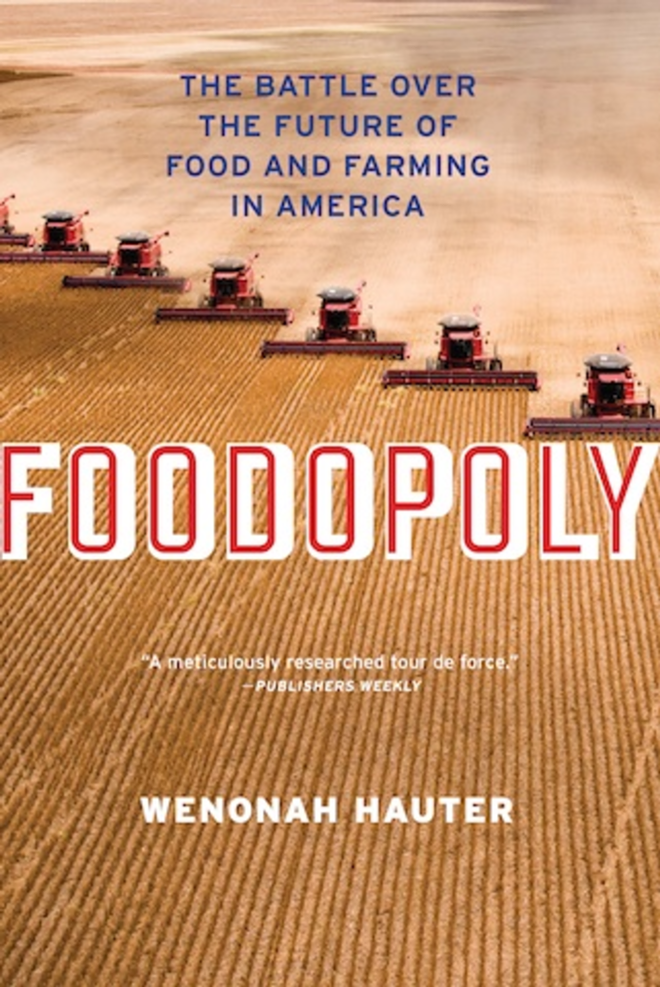
Wenonah Hauter is executive director of Food and Water Watch. She grew up on a farm 45 miles outside of Washington D.C. where she plucked chickens, worked in the garden, and chopped wood for the cook stove. There she learned firsthand about the struggles of running a small farm. Her book Foodopoly explores what’s wrong with America’s food system. Hauter sat down at our office to talk farming, Monsanto, and why people need to get political about food.
CL: What inspired you to write Foodopoly?
Wenonah Hauter: Over the course of my work over the last 35 years, I see that it’s harder and harder to get good public policy in Washington. Meanwhile we’ve had this great food movement springing up. But it’s not really focused on structural issues. I think fixing the food system is key to fixing our democracy and vice versa. I wanted to write a book that explained how we got here and had an overview of issues we’re facing.
You have a chapter called “Wal-Marting the Food Chain,” where you discuss how one out of every three American grocery dollars is spent at Wal-Mart. Last week the New York Times reported that Wal-Mart is now struggling to keep grocery shelves stocked. So, did you jump up and cheer?
Yes I did. I thought once in a while there’s justice. They can’t keep up produce because they need such volume. The grocery store chains, with Wal-Mart being the worst, are really what are driving the consolidation of farms. They don’t want to deal with small entities; Wal-Mart buys a billion pounds of beef every year. They want to deal with the biggest meatpackers. This model of selling food is responsible for a lot of problems we’re having today.
What should citizens know about Food and Water Watch’s “Monsanto: A corporate profile” and how it relates to the recent legislation that’s been called the “Monsanto Protection Act?”
The Monsanto rider is setting a horrific precedent. And it has nothing to do with genetic engineering. It’s Congress overstepping its bounds in separation of powers and the ability for judicial review. Under the National Environmental Policy Act, when the federal government makes a bad assessment, the citizens have a right to sue. And in the case of sugar beets the government didn’t do a good job, and the assessment was redone and the sugar beets were pulled up. Food and Water Watch looked at how much biotech spent over a 10-year period; we found over $272 million in lobbying and campaign contributions.
Do you think the relationship between the public and companies like Monsanto has changed since Prop 37, and other campaigns to get GMO’s labeled? Do you think big food corporations are starting to get defensive?
I do think they’re scared. We are reaching critical mass around the country. There is campaigning going on in 30 states. If we can pass a couple of these labeling bills, it will force the Feds to take action. I think it’s exciting that the consciousness around the country has been raised.
Where are family farms in the equation of the food industry?
You look at a midsized commodity grower in this country; the average income is $19,200. And half of that comes from government payment. We hear a lot about subsidies, we don’t hear a lot about what would happen if the subsidies go away. It’s easy to blame farmers for the dysfunctional food system, but when you look at who benefited it’s the retail industry, it’s those 20 food-processing companies that control most of the brands in the grocery store.
The number of farmers' markets nationally has increased greatly in the last few years. Is this part of the solution?
I think it's great that they’re increasing. I think there’s a lot the USDA could do to increase them more. But it’s not going to replace having a distribution system like when people go to the grocery store. We should strengthen farmers’ markets and fix policies that aren’t allowing farmers to distribute food. I’m hoping all the excitement about food leads people to get involved politically because this is a political problem.















